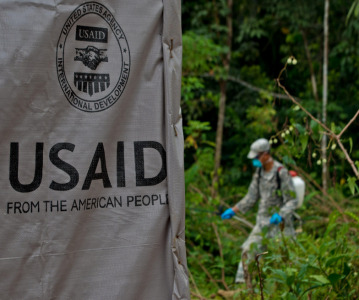bioLIVE to introduce global biopharma country ranking

Global analysis will rank each major biomanufacturing country’s market growth potential, innovation and competitiveness.
bioLIVE – the UBM bioprocessing and manufacturing event opening 9-11 October in Madrid – is to build on the success of last year’s global small molecule country rankings by introducing a biologics manufacturing and processing league table. The results of which will rank the perception of the world’s largest biologics markets for ‘overall quality’, ‘growth potential’ [for exports and domestic market], ‘innovation’ and ‘ability to meet future capacity constraints’.
“Biologics capacity is growing quickly and will increase by nearly 40% over the next four years. Asia and European countries are building more facilities, which is reducing the USA’s overall market share of capacity. What no one has yet evaluated is the relative perceived strengths of each region. The perception of each country will undoubtedly be a factor in realizing its growth potential,” added Rutger Oudejans, Brand Director at UBM for bioLIVE.
The study will evaluate the consequences for the supply chain, as with an increasing number of bio facilities globally, the perception of the ability to meet future demand could well be a decisive factor in major investment decisions. What will also become clearer is which markets are seen to have the best potential growth both domestically and for exports.
Last year’s small molecule ranking demonstrated that the traditional economies of the USA, Germany and Japan were still perceived as the strongest, but with the rapid emergence of newer bio regions – we could see countries like Korea, China and Singapore ranking much higher for large molecule manufacturing. Additionally, the research will also evaluate what the potentially geopolitical and supply chain risk is in newer regions, as well as the knowledge of bio professionals. Thus, we might see a picture emerging of certain countries being seen as exceptional for capacity and production, and others for knowledge and innovation.
One of key considerations behind launching bioLIVE was the potential benefits of integration of the small and large molecule industries. But also, with an increasingly globalized supply chain, it’s important that the industry can centralize and share learning. For example, information on which countries are the leaders in the associated types of services needed to help meet changing commercial requirements and bring bio products to market. These include activities as diverse as recruitment services to regulatory submission support, cell line development (e.g. CHO, mouse myeloma and human cell lines), analytical testing and custom assays.
A central feature of bioLIVE will be access to the best available bio content, and later this year, the company will also add a new biologics section to its annual expert report. Global bio industry experts such as Eric Langer are being called upon to forecast the industry’s’ direction over the next few years.
“One of the great successes of the small molecules space has been the internationalization of the supply chain, and we want to bring this experience and couple it with industry analysis from prominent experts, and new original research, so that we can better inform the bio community on the opportunities available. To sustain the next wave of growth, the industry will need to meet new partners, but also, access insights and content to know how best to work with new customers. With this in mind, bioLIVE will be a mixture of biotechs, big pharma and service providers, coupled with an extensive learning programme for bio processing and manufacturing professionals,” added Oudejans.
Related News
-
News US FDA adds haemodialysis bloodlines to devices shortage list
On March 14, 2025, the US FDA published an open letter to healthcare providers citing continuing supply disruptions of haemodialysis bloodlines, an essential component of dialysis machines. -
News Women in Pharma: Manufacturing personal and team success
Our monthly Women in Pharma series highlights the influential lives and works of impactful women working across the pharmaceutical industry, and how the industry can work towards making the healthcare industry and workplace more equitable and inclusive... -
News Pfizer may shift production back to US under Trump pharma tariffs
At the 45th TD Cowen annual healthcare conference in Boston, USA, Pfizer CEO Albert Bourla outlined the potential for Pfizer to shift its overseas drug manufacturing back to the US as pharmaceutical industry players weigh their options against Presiden... -
News Experimental drug for managing aortic valve stenosis shows promise
The new small molecule drug ataciguat is garnering attention for its potential to manage aortic valve stenosis, which may prevent the need for surgery and significantly improve patient experience. -
News Women in Pharma: Connecting accessible pharma packaging to patients – a Pharmapack Special
Throughout our Women in Pharma series, we aim to highlight how CPHI events encourage discussions around diversity, equity, and inclusion initiatives in the pharmaceutical industry. -
News Vertex Pharmaceuticals stock jumps as FDA approves non-opioid painkiller
UK-based Vertex Pharmaceuticals saw their stock shares soar as the US FDA signed off on the non-opioid painkiller Journavx, also known as suzetrigine, for patients with moderate to severe acute pain, caused by surgery, accidents, or injuries. -
News Trump administration halts global supply of HIV, malaria, tuberculosis drugs
In various memos circulated to the United States Agency for International Development (USAID), the Trump administration has demanded contractors and partners to immediately stop work in supplying lifesaving drugs for HIV, malaria, and tuberculosis to c... -
News 2024 Drug Approvals: a lexicon of notable drugs and clinical trials
50 drugs received FDA approval in 2024. The centre for biologics evaluation and research also identified six new Orphan drug approvals as under Biologics License Applications (BLAs). The following list picks out key approvals from the list, and highlig...
Recently Visited
Position your company at the heart of the global Pharma industry with a CPHI Online membership
-
Your products and solutions visible to thousands of visitors within the largest Pharma marketplace
-
Generate high-quality, engaged leads for your business, all year round
-
Promote your business as the industry’s thought-leader by hosting your reports, brochures and videos within your profile
-
Your company’s profile boosted at all participating CPHI events
-
An easy-to-use platform with a detailed dashboard showing your leads and performance







